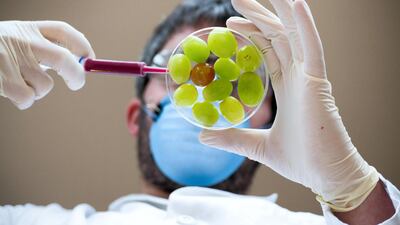The UK is planning to relax rules on gene-editing in farming, as it looks to shift agricultural policy following the country’s exit from the European Union, boost domestic food production and bolster international trade.
A consultation, which runs until March 17, will analyse whether gene-editing crops and livestock is permissable as ministers said changing the current rules, which originate from the EU, would benefit the farming sector and the environment.
“Gene-editing has the ability to harness the genetic resources that mother nature has provided in order to tackle the challenges of our age,” agriculture minister George Eustice told delegates at the Oxford Farming Conference on Thursday.
“Now that we have left the EU, we are free to make coherent policy decisions based on science and evidence. That begins with this consultation,” he said.

Gene-editing cuts sections of DNA within a single genome to introduce changes that were previously only possible through years of selective breeding in animals and plants.
Mr Eustice said this would help farmers produce crops resistant to pests, extreme weather and disease to ensure consumers receive healthier, more nutritious food.
This process differs to genetic modification, which is banned in the EU and involves mixing the DNA of one species with another. It will continue to be prohibited in the UK.
Mr Eustice said the editing process, which includes breeding crops that perform better and reducing costs for farmers, was “blocked by a European Court of Justice ruling in 2018”, a decision he called “flawed and stifling to scientific process”.
The consultation comes a week after the UK exited the EU, as the government considers future policy for the farming sector and looks to increase domestic production to boost food security and safeguard some of the challenges presented to supply chains by the pandemic.
Tim Smith, chairman of the trade and agriculture commission, said Brexit offered farming exporters and importers an “exciting opportunity” to establish trading relationships across the globe, including with the UAE and wider Middle East.
“The opportunity we've now got is greater than it's ever been for UK producers and farmers to export," he told The National.
"One of our recommendations will be a single point of contact within government that allows a new exporter to pick their country, pick their market and get assistance with that new piece of entrepreneurial activity."
Trade between the UK and the Gulf Co-operation Council hit almost £45 billion ($61.19bn) last year, with a Joint Trade and Investment Review already under way to help establish a free-trade agreement between the regions.
Rob Ward of the department for international trade said exports to the Middle East were already increasing. “The Middle East market is desperate for a lot of really good, healthy conscious products that we have a wealth of here," he said.
“They're really going for the anti-obesity agenda and we're good at that. So there's a lot of help to do it.”

During the Oxford Farming Conference, speakers raised concerns over food standards being lowered if Britain opted to loosen quality regulations.
Scotland’s rural affairs chief Fergus Ewing said regulations are needed to safeguard the future of the industry rather than leaving food production to the market.
“We are very concerned that cheap imported food post-Brexit may threaten British farming. We argued for legal protections against that, protections which were refused by the UK Government,” he said.
“Indeed, if we were to simply reduce, for example, our production of homegrown beef and replace it with imported beef, evidence suggests that our carbon footprint could well substantially increase.”
Mr Smith said while food standard concerns were "valid", the commission’s policy recommendations would not allow for any reduction in standards.
“There will be no turning back the clock on standards in any part of our recommendations on policy,” he said.
The government said gene-editing could result in the development of crops requiring fewer pesticides or fertilisers, or offer health benefits such as tomatoes to lower blood pressure that were recently approved in Japan.
Meanwhile, animal genes could be altered to produce livestock more resistant to certain diseases, in turn reducing the demand for antibiotics to fight infection.
However, Peter Stevenson of Compassion in World Farming said breeding disease-resistant livestock could lead to overcrowding and poorer animal welfare as farmers stock more intensively.
Gareth Morgan, head of farming at the Soil Association, raised concerns about the speed the government is "using Brexit to pursue a deregulatory agenda in this area".
The government said the consultation will focus on stopping certain gene-editing organisms from being regulated to the same degree as genetic modification, as long as they can be produced naturally or through traditional breeding.
"Techniques such as gene-editing are really a natural evolution of conventional approach to plant breeding," said Mr Eustice.
He said that future policy needed to be a fusion of the traditional principles "of good farm husbandry with the best technology available to us in the 21st century".
Prof Robin May, the Food Standard’s Agency’s chief scientific adviser, said gene-edited foods will be marketed only if they do not present a risk to health, mislead consumers or have lower nutritional value that existing foods.
“We will continue to put the consumer first… Any possible change would be based on an appropriate risk assessment that looks at the best available science," he said.


